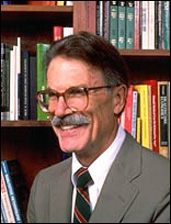John Farquhar, MD
Born: 1927

Jack Farquhar is a pioneer in the population approach to CVD prevention, initiating and directing the Stanford Heart Disease Prevention Program. He was educated at the University of California and received his MD in 1952, with specialty training subsequently in California, Minnesota, and the Rockefeller University.
Farquhar began his cardiovascular career with diet and lipid research in the metabolic wards of the Rockefeller Institute with Ed Ahrens. Back in Stanford, he collaborated early in clinical investigations of metabolism with Gerald Reaven and Peter Wood. After a productive period in clinical research, he took a 1968 sabbatical at the London School of Hygiene and Tropical Medicine. There, and during attendance of the first Ten-day Seminar in CVD Epidemiology in Dalmatia, his interest and energies turned to broad questions of social causes and prevention of chronic disease in populations. As he described it, he “bounced ideas” first against Donald Reid and then Geoffrey Rose during a delightful year of renewal and redirection in London.
On return to Stanford, Farquhar joined ideas and forces with leading figures there in social learning theory and mass communications and initiated among California communities the earliest “quasi-experiments” in health promotion. These research demonstrations became classics in the field; their theory base and media emphasis were widely adopted for community interventions.
In his latter years at Stanford, Farguhar organized a vigorous international consortium and a series of expert reports called successively “Victoria, Catalonia, Osaka, and Singapore Declarations.” These documents provided mission, priorities, and guidelines for CVD prevention to medical professionals, health ministries, and national legislatures; through them he became an acknowledged international health leader.
In “active emeritus” status at Stanford, Farquhar has complemented these actions on the political plane with popular professional education and self-help programs. Always a jump ahead, he has applied innovative experimental strategies to current issues in “Alternative Medicine,” such as the health effects of soy, garlic, and ginkgo biloba! “May the saints presarve us!” (HB)
Please click here for a description of the Stanford Community Trials.
Sources
Interview with H. Blackburn, 2003
http://prevention.stanford.edu/facultystaff/detail.asp?7